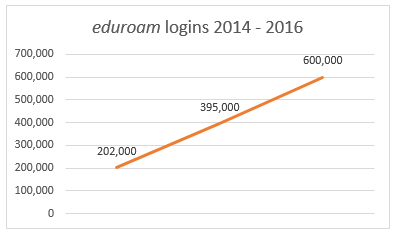Over 600,000 logins to eduroam service in a single day during the first week back at school, a threefold increase from 2014
[Ottawa, ON]
During the first week of classes across Canada last week, students, staff and faculty used a powerful digital service that they probably weren’t even aware of.
eduroam, the global wireless service offered in Canada through CANARIE’s Canadian Access Federation, enables staff, students and faculty to seamlessly join the campus wireless network when visiting another institution, using the username and password issued by their home institution. The Canadian eduroam service is part of a global community supporting eduroam, enabling seamless roaming at countless universities, colleges and research institutions worldwide.
Use of eduroam has grown tremendously in recent years. Peak day usage in the first week of classes is a great indicator of growth, and this year, the peak day had three times as many logins as in 2014. The chart below illustrates this growth over time:

This growth demonstrates how seamless wireless roaming has become a critical service for Canada’s increasingly mobile students, staff and faculty.
“In a world where research and education is a globally collaborative enterprise, providing secure, seamless access to networks and tools becomes mission-critical,” says Tariq Al-idrissi, Associate Vice President, Information Technology at Trent University.
The eduroam service is part of a suite of identity and access management services that streamline access, in a highly secure manner, to wireless networks and distributed data and tools. Offered by CANARIE’s Canadian Access Federation, participants benefit from stringent community-developed standards for identity verification and access authorization, so that individuals are able to use their home institution’s credentials (username and password) to access a wide range of distributed resources.
“The growth of eduroam speaks to the need to continually evolve digital infrastructures and tools, as today’s highly mobile research and education communities are leveraging resources located across Canada and around the world,” says Mark Wolff, Chief Technology Officer at CANARIE.
More information on services offered by the Canadian Access Federation may be found here: canarie.ca/identity/.
For more information, please contact:
Ela Ienzi
Communications Manager
CANARIE Inc.cafident
(613) 943-5432
ela.ienzi@canarie.ca
About CANARIE
CANARIE designs and delivers digital infrastructure, and drives its adoption for Canada’s research, education and innovation communities. CANARIE keeps Canada at the forefront of digital research and innovation, fundamental to a vibrant digital economy.
CANARIE’s roots are in advanced networking, and CANARIE continues to evolve the national ultra-high-speed backbone network that enables data-intensive, leading-edge research and big science across Canada and around the world. Researchers, scientists and students at almost 600 Canadian institutions, including universities, colleges, research institutes, hospitals, and government laboratories have access to the CANARIE Network.
CANARIE also leads the development of research software tools that enable researchers to more quickly and easily access research data, tools, and peers. In support of Canada’s high-tech entrepreneurs, CANARIE offers cloud-computing services to help them accelerate product development and gain a competitive edge in the marketplace.
Twelve provincial and territorial network partners, together with CANARIE, collectively form Canada’s National Research and Education Network. This powerful digital infrastructure connects Canadians to the national and global data, tools, colleagues, and classrooms fuel the engine of innovation in today’s digital economy.

